Survey identifies motivations and barriers for whānau interested in relocating to East Coast.
One of the largest surveys of whānau living away from the East Coast has cast light on what it would take to attract some of the 70,000+ Ngāti Porou to move back to their tribal lands.
500 people responded to an online survey which was designed and administered by Ruatoria-based Hikurangi Huataukina Trust and promoted through the Ngati Porou Proud Facebook group run by Jackie Taukamo-Grace.
The Trust has a sustainable economic development focus and is keen to encourage whānau to relocate back to the Coast so wanted to see what the barriers were and what would be the main motivations for them choosing to return.
“We are really pleased with the results, it is incredibly rich information that can help those of us living at home understand why such a large proportion of our relations still choose to live away from the Coast and what it would take for them to return” said Trust chairperson Panapa Ehau.
“What is most exciting is that a good proportion of the whānau are already well advanced in plans to relocate back to their turangawaewae between Kaiti and Potaka.”
“Whānau bringing skills and resources can help increase opportunities for others – we don’t expect most whānau will relocate but if we know what the level of interest is then we can plan to accommodate those who are interested and support their aspirations where possible.”
Three quarters of respondents were from New Zealand, nearly a quarter were from Australia and 10 participants were from other places in the world including the USA, UK, Thailand, China, Somalia, Hong Kong and The Philippines.
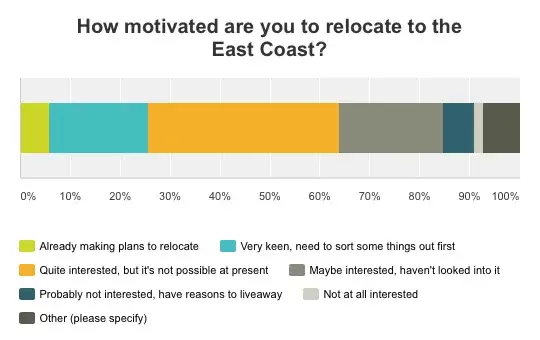
One quarter of the respondents were very keen or already making plans to relocate back to the East Coast. Two thirds were interested but not right now and only two percent said they would never want to relocate back to the region.
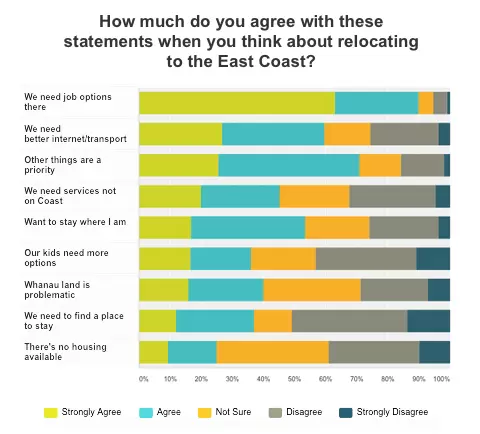
Jobs were the most important factor in considerations about relocating, followed by existing commitments keeping families staying where they are at present. Most respondents saw significant opportunities for children on the Coast rather than the geographic isolation and fewer services being a limitation, likewise the availability of suitable housing was a real concern for only about a quarter of participants.
Four main barriers to relocating were identified: economic and employment issues was the most significant concern by a long way – this included a lack of capital to build or fix up an old home on family land, access to services, particularly educational opportunities, for whānau members was the next largest set of barriers followed by infrastructure issues (transport, internet and housing) and cultural issues were the other significant set of concerns which included a fear of cultural obligations, a lack of Te Reo, disconnection with tikanga and complications around access to family lands.
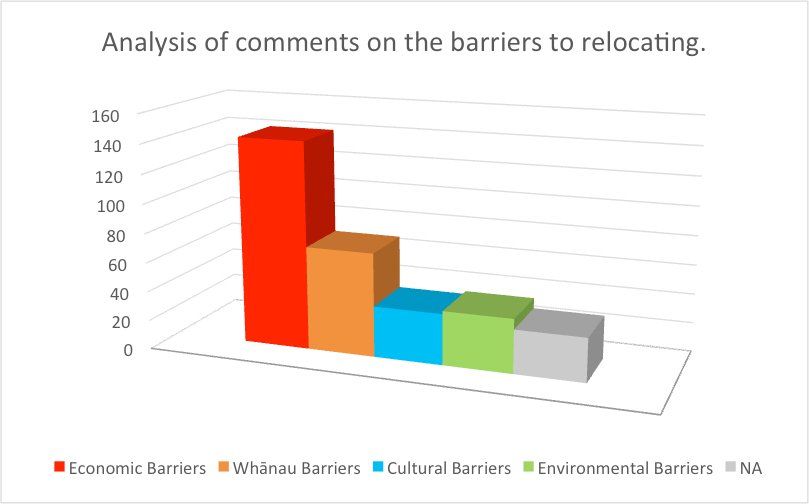
Dorina Paenga lives in Hamilton with her husband and three young children, and did the analysis of the key section of the survey focused on barriers to relocation. “There was lots going through my mind when reading and analysing the comments, and there is no quick solution for any of the barriers identified by whanau” said Ms Paenga. She did however identify three key opportunities:
- The biggest challenge is managing the expectations of our people. We need to have better access to more accurate information about life on the Coast today. We can’t expect to have access to some of the necessities and conveniences of large cities or be free from some of the cultural obligations that come with life on the Coast.
- There is a real opportunity to stimulate whānau engagement around these issues through considered dialogue, inspiring conversation and rich korero. If what we talk about informs our development for tomorrow – what do you want to talk about today?
- There is significant interest in moving home, and the survey identified many barriers for whānau, and rightly so, however perhaps we need to lift our horizons? Maybe we need to consider why we want to move home and consider aspirations favouring the collective? If we are led by why we want to move home, rather than what we need to be able to move home – responses may be very different…more solution driven perhaps.
Some of the comments in this section were heart-breaking including fear of negative influences on children and previous unsuccessful attempts to reunite with whānau living at home.
- “Concerned about the social impact of moving to the coast, my children would be exposed to generational unemployment, drugs and alcohol,”
“Not enough jobs and the most of the houses are not up to standard.”
“People at home can be hostile towards others coming back in from outside of the rohe. Especially if you are from the next generation and were born outside of the rohe because you don’t have those relationships. Its even a problem for those who are from there but moved away. One of my whanau moved back after 30 years away and had trouble integrating back into the community.”
“Like every other Coastie who went to the city to better themselves and want to return to Tairawhiti with new skills, we are hindered by a lack of economic development. For us Coasties living in Aussie you need to come home set up or failure is imminent. I’ll be home in three years as I’ve planned it. The biggest issue I have is the endemic growth of meth in Gizzy and the reduction of the workforce but the rise of juvenile crime. When I come home (twice a year) the greatest sadness is Meth and youth with no work ethic or goals! When I sit at home on Rahui marae I feel sad for those who went to war and sacrificed all they did so the youth today can beat it up, smoke it, steal it or walk away and let someone else fix their raru. Just being honest from a Coastie living in Perth but never ever stops coming home.”
“The bro and his whanau have hogged all best sites for building on.”
“Although my mum grew up in Ruatoria and my grandparents made a life there, all our immediate whanau left the Coast and we as a whanau are disconnected from the coast but we’re still a tight knit whanau. Proud to say we’re from Rangitukia but we’re whakama, our whanau don’t have the reo and we’re whakama about that. It’s intimidating actually and we feel judged. We hear from our parents that Ruatoria is different from when they went to Manutahi School, it’s not the hub of activity it used to be. As a whanau if there was an outreach to whanau who felt disconnected from the hau kainga with no judgment we would come to the Coast more often, there’s no where we can rock up and say we’re staying. It’s so sad but it’s reality for our whanau.”
Others were more optimistic about the possibility of returning one day:
- “When the time is right & my children have flown the coop, then my partner & I would look into moving to what we think is paradise in Uawa.”
“We’re in the process of securing whanau land to build a house on for the future generations.”
“I’m doing a teaching degree at present to help me get employment once I move home. I am hoping this degree will get me a job at a school on the Coast.”
“I have been thinking for quite a while to relocate back to my kainga, just don’t want to go back there with no money and start over so am building-up a cash-flow and some assets to take Back to my lands, and am working on some business ideas to contribute to local iwi and community groups, I will be returning within the next 2-3 years.”
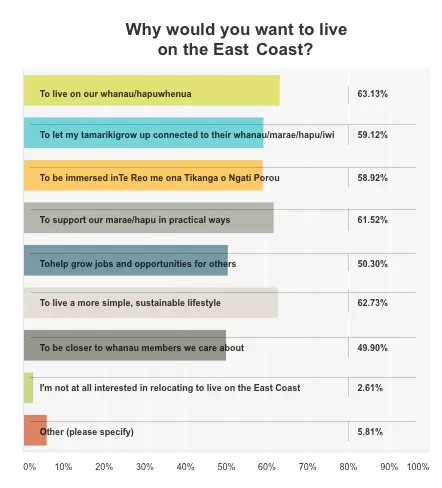
“TO LIVE THERE, TO GROW OLD THERE, AND TO BE BURIED THERE.”
The main reason participants gave for wanting to relocate home were around a desire to live on their whānau/hapū whenua, live a more simple, sustainable lifestyle and contribute to the life of their marae/hapū in practical ways on a day to day basis. Other important considerations were the opportunities for children to grow up better connected to their whānau, marae and hapū, and to be immersed in Te Reo me ona Tikanga o Ngāti Porou. One participant put it simply: “To live there, to grow old there, and to be buried there.”
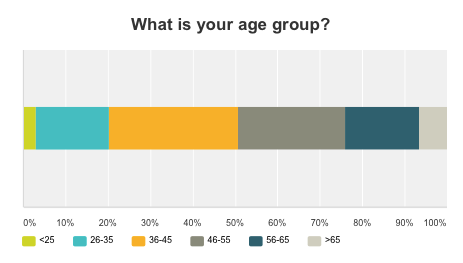
In terms of the ages of those responding, the largest proportion (30%) were in the 36-45 year age group, followed by those aged 46-55 years, only 3% were aged under 25 and 7% over 65 years. One 79 year old still has aspirations of moving back into their family home on the Coast.
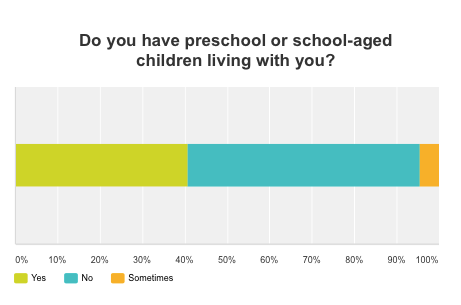
One of the most surprising findings was that just over half of respondents know they have shares in Māori land on the Coast but over a quarter were not sure if they do or not and 23% said they do not.
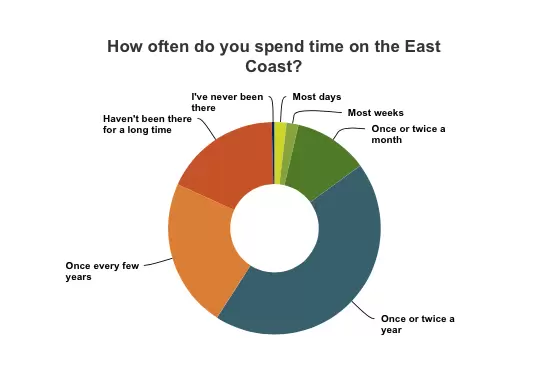
Only 2 of the 500 participants said they have never been to the East Coast but over 40% said they visit only every few years or haven’t returned for a long time. 44% said they return once or twice a year and 11% visit once or twice a month.
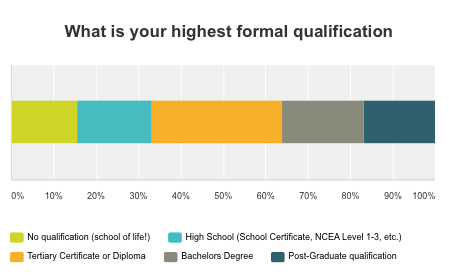
17% of participants have a post-graduate qualification, 19% a bachelors degree, 31% a diploma or other tertiary qualification, 18% have a school certificate as their highest qualification and 16% have no formal qualifications.

Asked where they would relocate to if they did return (based on the local rugby team), the rohe was fairly evenly represented with Ruatoria and Gisborne being the most popular closely followed by Waiapu (Tikitiki/Rangitukia) and Tokomaru-Tawhiti.
One respondent summed up the experience and aspirations of many:
- I didn’t grow up at home. Whanau moved to Australia when I was a baby. 28 now, went back for the first time since birth when 19. Have been back every year since (for tangi, my admission (took it up the coast), etc.). Don’t feel I have close enough whanau who I can just rock up too. Although there’s heaps of whanau, I don’t have a “nanny” who I feel I can just show up to whenever. I’m working on it. I identify strongly as a Ngāti and it’s core to my identity.
Hikurangi Huataukina Trust have shared the findings with Te Runanganui o Ngati Porou, hapū groups and other stakeholders. A summary of the results are published at www.hikurangi.enterprises
Mr Ehau says it will take some time to work through all the issues identified but the depth of feedback provided has been humbling and a strategy to address the main barriers needs to be developed for the iwi and within hapū, marae and whānau – both between those living on the Coast and those with an interest in relocating.
“The survey findings provide a real source of inspiration and hope that there is a strong pull to come home, that those living away have skills, talent and resources they want to contribute to revitalising our hapū, marae and whenua, and there is much we can do to make it easier and more attractive for whānau to relocate to their turangawaewae.”
Hikurangi Huataukina Trust made three key recommendations based on the survey findings for those living on the Coast:
- WHANAUNGATANGA: Encourage positive connections. Many whānau who have lived away for more than a generation don’t feel confident engaging with their relations at home. Those living on the Coast need to make more commitment to connecting in positive ways with those living away, especially creating spaces and opportunities to bring whānau home for positive experiences. Laptops & Long Drops – a Facebook group for whānau who want to explore the opportunities and challenges of moving back to the Coast is here.
- MARAMATANGA: Share accurate information. Whānau interested in moving home may not appreciate how accessible and reliable the internet is now for most of the Coast, how amazing most of the schools are and how the roads aren’t so bad once you get used to them. An awareness and education campaign focused on the infrastructure and services like schools and health providers could be useful. That doesn’t mean ignoring the challenges but sharing the reality might help dispel some myths. Laptops & Long Drops can help with this but there will be a range of ways this information can be shared both personally and publicly.
- WHAIRAWA: Support enterprise development. Jobs is a priority and there could be more encouragement to think about work that whānau can do from the Coast and more resources dedicated to building a supportive environment for entrepreneurs, start-ups and remote workers. Check out Iti Te Kōpara, an economic development plan developed by Hikurangi Takiwa Trust that is the basis for Hikurangi Huataukina Trust and Hikurangi Enterprises Ltd. There are a number of other hapū and iwi initiatives working hard to create jobs and an environment that supports new businesses and tele-commuters to base themselves on the Coast.
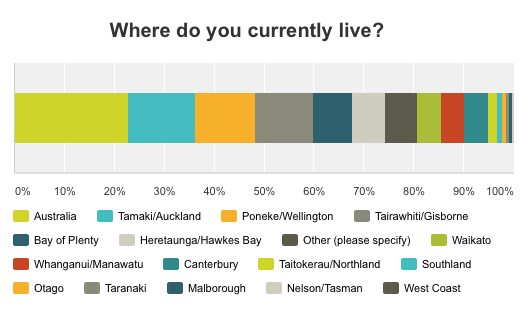
Mr Ehau and his young whanau moved back home to Ruatoria three years ago from Raglan to raise his tamariki so that they know their turangawaewae and said there are a growing number of whānau relocating back to the Coast – some who have lived away for a generation or two.
“It can be really scary and cost a lot, both in terms of trying to set up a home and in giving up work, educational and social opportunities that other places offer. But we are home! The cultural value can’t be underestimated and the opportunities to live a different pace of life where our tupuna once walked makes our whānau richer than we could be anywhere else in the world.”
The survey of 500 respondents was conducted between 7 April and 24 September has a margin of error of plus or minus five per cent at 90 per cent confidence level.
For more information contact Panapa Ehau: Tel. 027 2000 747 / Email: panapa@hikurangi.enterprises
Location of respondents:
- Auckland: 13%
- Wellington: 12%
- Gisborne: 12%
- Bay of Plenty: 8%
- Hawkes Bay: 7%
- Waikato: 5%
- Manawatu: 5%
- Canterbury: 5%
- Australia: 23%
- Other: 10%








